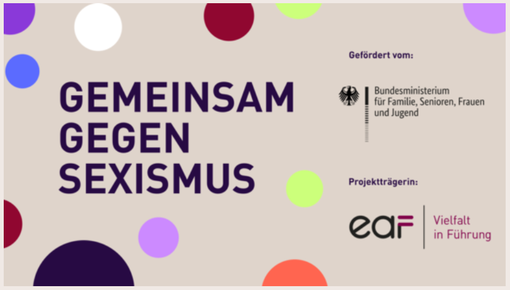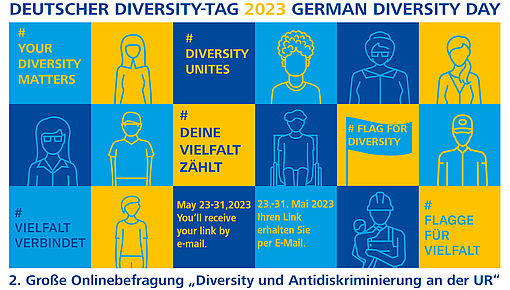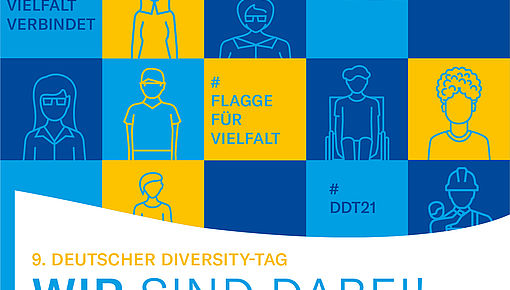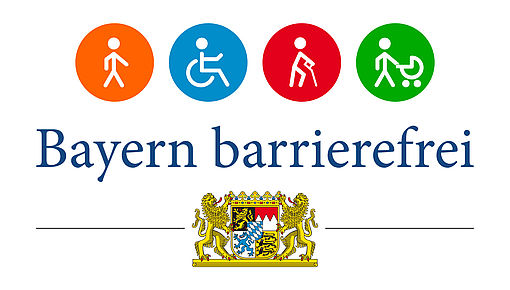
Diversity & Anti-Discrimination
Welcome to the Diversity Portal!
As an educational and research institution with responsibility for society as a whole, the University of Regensburg works towards an environment in which equal opportunities across all dimensions of diversity are practiced with the aim of equal participation, appreciation and promotion of all members, regardless of their individual characteristics (gender, sexual orientation, age, physical and mental abilities, social origin, nationality/ethnicity, religion) and discrimination is avoided. The reduction of structurally induced discrimination such as entrenched hierarchies, discrepancies in the distribution of resources and the opening up of opportunities should be just as much a focus as the commitment to barrier-free, tolerant, respectful working, teaching and learning conditions that lead people with the most diverse prerequisites and potentials to the best results.
Our team
The Vice President for Internationalization and Diversity
The Vice President for Internationalization and Diversity is responsible in the area of anti-discrimination & diversity for all members of the University of Regensburg.
Since 01.04.2020 Prof. Dr. Ursula Regener is the first Vice President for Internationalization and Diversity.
Anti-Discrimination Point
The anti-discrimination point assists the Vice President for Internationalization and Diversity.
It supports existing structures and points which work against discrimination and it bundles activities. It is the first contact point for all questions and concerns related to diversity and discrimination.
CONTACT
 Dr. Birgit Bockschweiger
Dr. Birgit Bockschweiger
Consultant for anti-discrimination & diversity
Contact person for sexual harassment and sexualized violence
Consultat against anti-Semitism at the UR
antidiskriminierung@ur.de or birgit.bockschweiger@ur.de
Phone: +49 941 943-2364
Room: PT3.2.32
Contact person for sexual harassment and sexualized violence
As a contact person in cases of sexual harassment and sexualized violence, you are welcome to contact me at any time. You have the opportunity for a confidential conversation in which you can tell what happened to you and what your concerns are. You can ask questions and agree on the further procedure while remaining anonymous.
CONTACT
 Dr. Birgit Bockschweiger
Dr. Birgit Bockschweiger
Consultant for anti-discrimination & diversity,
Contact person for sexual harassment and sexualized violence,
Consultat against anti-Semitism at the UR
antidiskriminierung@ur.de or birgit.bockschweiger@ur.de
Phone: +49 941 943-2364
Room: PT3.2.32
Consultant against anti-Semitism at the UR
As a contact person in cases of anti-Semitism, you are welcome to contact me at any time. You have the opportunity for a confidential conversation in which you can tell what happened to you and what your concerns are. You can ask questions and agree on the further procedure while remaining anonymous.
CONTACT
 Dr. Birgit Bockschweiger
Dr. Birgit Bockschweiger
Consultant for anti-discrimination & diversity, Contact person for sexual harassment and sexualized violence,
Consultat against anti-Semitism at the UR
antidiskriminierung@ur.de or birgit.bockschweiger@ur.de
Phone: +49 941 943-2364
Room: PT3.2.32
Student team of the Anti-Discrimination Point
The student team of the Anti-Discrimination Point is the first point of contact for students. In the sense of peer-to-peer contact, the team acts as a guide. It is a link between the student body and the Anti-Discrimination Point.
Contact
 SHK-Team of the Anti-Discrimination Point
SHK-Team of the Anti-Discrimination Point
If you would like your diversity-specific offer to appear in the diversity portal with a link to your homepage, please send us an e-mail to antidiskriminierung@ur.de













